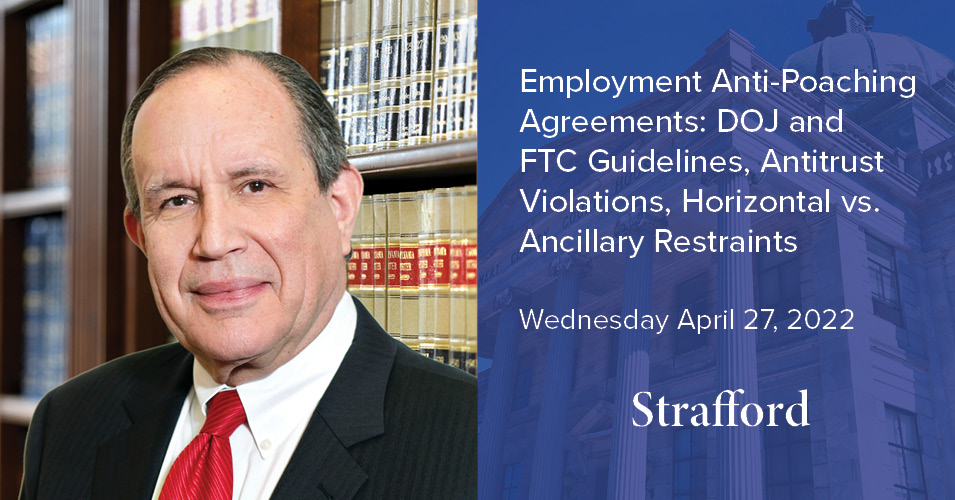High Swartz Employment Law attorney Thomas D. Rees will be speaking in an upcoming Strafford live video webinar, "Employment Anti-Poaching Agreements: DOJ and FTC Guidelines, Antitrust Violations, Horizontal vs. Ancillary Restraints" scheduled for Wednesday, April 27, 1:00pm-2:30pm EDT.
Employees are the most valuable assets of any company. They create and protect trade secrets and cultivate customer/client relationships. A no-poaching agreement is an agreement between employers and businesses not to recruit certain employees or not to compete on compensation terms.
The Department of Justice's (DOJ) Antitrust Division opened its first major no-poach case in 2010, when it filed civil complaints against several Silicon Valley companies--including Lucasfilm, Pixar, Google, Apple, Adobe, and Intel--for instructing recruiting managers to enter into "no cold-call" agreements, in which the companies agreed not to initiate contact with one another's employees and to notify each other when making an offer to one of their employees. The settlements cost the defendant companies more than $400 million. In 2016, the DOJ and the Federal Trade Commission (FTC) issued guidance that warned that the DOJ could bring criminal charges against managers, recruiters, and C-suite employees who initiate no-poach agreements.
On July 9, 2021, President Biden issued an executive order to prevent anti-competitive conduct, calling on the FTC to engage in rulemaking to prevent the unfair use of noncompete agreements. Thereafter, the DOJ has filed criminal charges for the first time against a company for using an employee no-poaching agreement. A federal grand jury returned a two-count indictment charging Surgical Care Affiliates LLC (SCA) for agreeing with competitors not to solicit senior-level employees from each other. SCA owns and operates outpatient medical care centers across the country. The charges demonstrate the DOJ's commitment to criminally prosecute collusion in the U.S. labor market.
The means of restricting future employment is important. Horizontal restraints are often unreasonable per se under federal antitrust principles, meaning they are deemed illegal without any inquiry into their anti- or pro-competitive effects. If a horizontal restraint qualifies as an "ancillary" restraint, it is analyzed under the rule of reason to determine if it is legal. To qualify as an ancillary restraint, the restraint must be subordinate and collateral to a separate, legitimate transaction.
Our panel will advise employment counsel on current enforcement by the DOJ and FTC of anti-poaching provisions in agreements that prohibit one company from hiring another company's employees. The panel will discuss recent cases that determine whether no-poach provisions violate applicable antitrust laws and what restrictive covenants may be enforceable. The panel will guide employers on best practices for achieving business protection through less anticompetitive means.
We will discuss these and other relevant topics:
- What is the current FTC and DOJ guidance on anti-poaching?
- When do anti-poaching provisions violate antitrust laws?
- What are some current cases the DOJ has brought against companies for anti-poaching violations?
- How can a restraint be seen as ancillary rather than horizontal?
After our presentations, we will engage in a live question and answer session with participants so we can answer your questions about these important issues directly.
For more information or to register, call 1-800-926-7926, or visit the Strafford website.
Ask for Employment Anti-Poaching Agreements: DOJ and FTC Guidelines on 4/27/2022 and mention code: ZDFCA.
